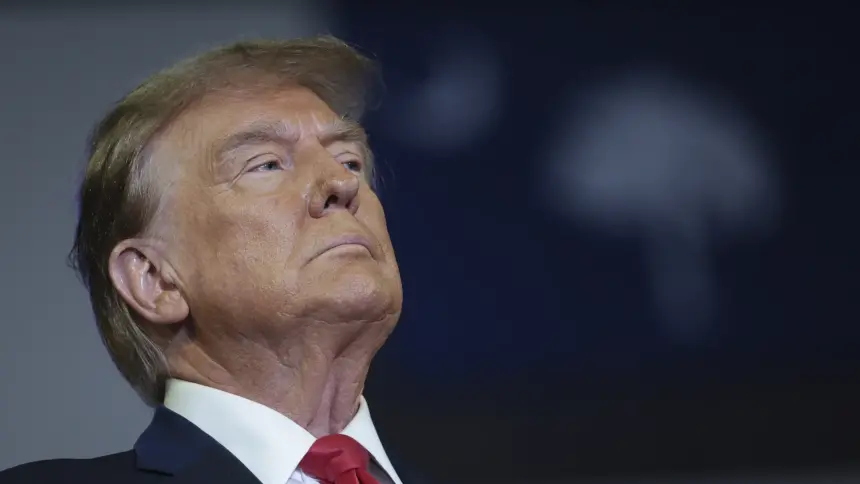Former President Trump cannot be barred from Colorado’s primary ballot under the 14th Amendment, the Supreme Court ruled unanimously on Monday.
This ruling, however, brings an end to a case filed against him following his actions leading to the Jan. 6 attack on the Capitol. And he is now all set to go.
The court’s decision comes a day before Super Tuesday, when more than a dozen states including Colorado will hold primary contests.
We're now on WhatsApp. Click here to join.
Trump can appear on Colorado ballot: This is a major win for the GOP presidential frontrunner and paves the way for him to appear on the ballot nationwide, despite facing eligibility challenges in dozens of states.
In a ruling devoid of dissension and lacking an author, the court overturned the Colorado Supreme Court’s verdict, which had concluded that Trump’s eligibility for the presidency was nullified under section 3 of the 14th Amendment of the Constitution.
This clause bars individuals who once held public office but subsequently participated in insurrection from pursuing various governmental positions.
The court rebuked the Colorado Supreme Court’s assumption that states possess the authority to declare a presidential or federal candidate ineligible.
This decision unequivocally asserts that it falls upon Congress, not individual states, to establish protocols for implementing the 14th Amendment provision against aspirants for federal offices, thereby extending the ruling’s applicability nationwide.
States, nevertheless, maintain the prerogative to disallow individuals from running for state positions under section 3.
“As the Constitution vests in Congress, rather than states, the responsibility for enforcing section 3 against all federal officeholders and candidates, we hereby reverse,” the ruling proclaimed.
By focusing on this legal inquiry, the court sidestepped any evaluation or verdict on whether Trump’s actions amounted to insurrection.
Following the ruling, Trump lauded the decision in a capitalized post on his social media platform, celebrating it as a “Big win for America!!!”
Beyond preserving Trump’s candidacy in Colorado, the ruling quells similar legal challenges that have surfaced. To date, only two other states, Maine and Illinois, had mirrored Colorado’s stance, with both decisions temporarily halted.
Colorado Secretary of State Jena Griswold acknowledged the court’s ruling, conceding that states lack the jurisdiction to enforce Section 3 of the 14th Amendment concerning federal candidates. Accordingly, Trump remains an eligible contender in Colorado’s 2024 Presidential Primary.
This Supreme Court decision closes one avenue for holding Trump accountable for his actions in contesting the 2020 election outcome, including his encouragement of supporters to converge on the Capitol on Jan. 6.
Facing criminal charges for the same actions, Trump’s broad assertion of presidential immunity will be scrutinized during oral arguments before the Supreme Court in April.
The ruling cautioned against the perils of disparate rulings across the nation, warning of potential election chaos if state officials were empowered to dictate ballot eligibility for presidential candidates.
This scenario could lead to a candidate being deemed ineligible in some states while remaining eligible in others for the same conduct, the ruling cautioned.
While the final vote was unanimous, divisions within the court, predominantly along ideological lines, persisted on the case’s resolution. The three liberal justices expressed reservations, contending that the court delved beyond necessity in outlining Congress’s role in enforcing section 3.
Conservative Justice Amy Coney Barrett concurred that the court had exceeded its mandate but refrained from joining the liberal justices’ opinion.
The liberals cautioned that the ruling might shield Trump from future controversies and foreclose alternative federal enforcement avenues for section 3.
Barrett emphasized the unanimity of the decision, urging Americans to focus on the consensus rather than amplifying dissent in such a politically charged case.
The Colorado court’s decision, rendered on Dec. 19, was rooted in section 3, enacted post-Civil War to bar former Confederates from reclaiming power in the U.S. government.
The case presented novel legal inquiries, including the applicability of the language to presidential candidates and the authority to determine involvement in insurrection.
Trump and his allies, alongside Republican proponents, argued against the application of the 14th Amendment and contended that the events of Jan. 6 did not constitute insurrection.
The initial lawsuit, filed on behalf of six Colorado voters by the government watchdog group Citizens for Responsibility and Ethics in Washington and two law firms, alleged that Trump instigated a violent mob to disrupt the counting of electoral votes.
Colorado, among more than a dozen states holding its primary election on Tuesday, witnessed the culmination of this legal saga.
Related: Trump Appeals $454 Million Judgment NY Civil Fraud Case





